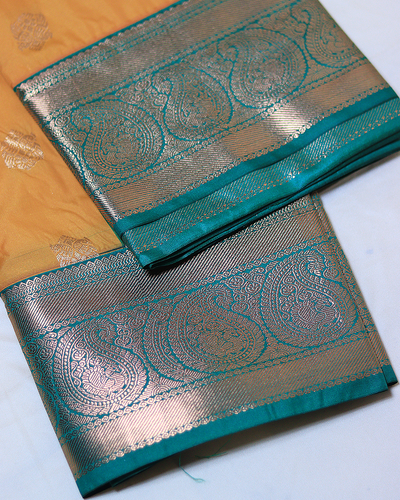How to Buy Your First Paithani Saree

A Complete Guide to Buying Your First Paithani Saree
Purchasing your first Paithani saree is a significant and exciting milestone. Known for their intricate weaving, luxurious silk, and regal zari work, Paithani sarees are a timeless addition to any wardrobe. Whether you're buying it for a special occasion, as a cultural statement, or as an heirloom, this guide will help you make an informed decision.
1. Understand What Makes a Paithani Special
-
Origin: Authentic Paithani sarees come from the town of Paithan and nearby regions in Maharashtra. They reflect centuries-old weaving traditions.
-
Materials: Pure silk and genuine zari are key components of a traditional Paithani saree.
-
Signature Features:
-
Handwoven using traditional techniques.
-
Intricate motifs like peacocks, lotuses, and vines.
-
Reversible borders with identical designs on both sides.
-
A shimmering “kaleidoscope effect” created by interweaving two different colors.
2. Decide Your Budget
-
Paithani sarees range from moderate to premium price points depending on:
-
The complexity of motifs.
-
The amount and purity of zari used.
-
The time required for weaving (simple designs may take weeks, while intricate ones can take months).
-
Pro Tip: Be prepared to invest in an authentic handwoven Paithani saree—it’s a lifetime asset.
3. Choose the Right Type of Paithani
Paithani sarees come in various styles, catering to different preferences:
-
Traditional Paithani: Features bold motifs and vibrant colors like red, green, and yellow. Ideal for weddings and festivals.
-
Contemporary Paithani: Includes pastel shades and modern designs, perfect for receptions or semi-formal events.
-
Single-Colored Paithani: The body and pallu are woven in the same color for an understated, elegant look.
-
Dual-Tone Paithani: Features a shimmering effect with contrasting warp and weft threads.
4. Select the Perfect Color
-
Traditional colors like royal blue, purple, red, and green are popular choices for special occasions.
-
Consider your skin tone and personal style when selecting colors:
-
Fair Skin: Deep reds, purples, or vibrant greens.
-
Medium Skin: Earthy tones like maroon, mustard, or burnt orange.
-
Dusky Skin: Bright yellows, emerald greens, or cobalt blues.
5. Look for Authenticity
To ensure you're buying an authentic Paithani saree:
-
Check the Weave: Handwoven sarees have a flawless finish but may have minor irregularities, unlike machine-made sarees.
-
Test the Zari: Genuine zari threads are made from gold or silver-coated materials and won’t tarnish easily.
-
Ask for Certification: Trusted sellers often provide authenticity certificates for premium Paithani sarees.
-
Inspect the Reverse Side: A genuine Paithani will have no loose threads on the reverse.
6. Choose a Reliable Seller
-
Where to Buy:
-
Directly from Paithan or Aurangabad-based weavers for traditional designs.
-
Reputed saree shops or online platforms like House of Hind specializing in handloom sarees.
-
Recommendations: Seek reviews or referrals to find trustworthy vendors.
-
Pro Tip: Be cautious of imitations sold at unusually low prices.
7. Consider the Occasion
-
For Weddings: Choose vibrant sarees with heavy zari work and intricate motifs.
-
For Festivals: Go for bold colors and simpler designs with a traditional touch.
-
For Casual or Semi-Formal Events: Opt for lightweight Paithani sarees with minimal zari work.
8. Styling Your Paithani Saree
-
Pair the saree with an embroidered blouse that complements its colors and motifs.
-
Add traditional Maharashtrian jewelry, like a nath (nose ring), thushi necklace, and green bangles, to complete the look.
-
Hairstyles like a classic bun adorned with gajra (jasmine garland) or a sleek braid enhance the saree’s elegance.
9. Care and Maintenance
-
Storage: Always store your Paithani saree in a cotton or muslin cloth to protect it from dust and humidity. Avoid plastic covers.
-
Cleaning: Dry clean only, especially for sarees with heavy zari work.
-
Occasional Airing: Air the saree every few months to prevent moisture buildup and maintain its sheen.
10. Embrace the Legacy
Owning a Paithani saree is not just about buying a piece of clothing; it’s about cherishing a piece of history and artistry. By choosing an authentic, handwoven saree, you’re supporting skilled artisans and preserving a rich cultural tradition.
